Lea Porcelain lure listeners into a neat cobweb of delicately layered drums and synths. Melancholic vocals smoothly glide through the timelessness that goes on for long enough to transport you to a state of meditative calm, and the incense burning on stage at their live shows further intensifies this shamanistic aspect. In the four years that passed since the release of their debut album, Hymns to the Night, Julien Bracht and Markus Nikolaus sharpened their songwriting and made sure everything falls in its place on their ambitious new record, Choirs to Heaven, which articulates more clearly their desire to fill larger spaces and never stop learning and growing.
 Speaking to the two musicians, you quickly understand that they believe in what they do and have faith in one another. Something in their music and their presence seems to indicate that friendship lies at the very core of the project, and both readily confirm my assessment. “I think friendship is the start of it all,” Markus nods, “if you make music, especially at the beginning, there has to be friendship. And that is important because nowadays you have a lot of sessions and songwriting sessions, which is good because you can develop a friendship and through that, you can make great music, but I think it is the start of it all to have a common ground. A good song can develop if one person understands the other one.”
Speaking to the two musicians, you quickly understand that they believe in what they do and have faith in one another. Something in their music and their presence seems to indicate that friendship lies at the very core of the project, and both readily confirm my assessment. “I think friendship is the start of it all,” Markus nods, “if you make music, especially at the beginning, there has to be friendship. And that is important because nowadays you have a lot of sessions and songwriting sessions, which is good because you can develop a friendship and through that, you can make great music, but I think it is the start of it all to have a common ground. A good song can develop if one person understands the other one.”
Legacy of the night
Both already had their respective careers going when they decided to form the band, and it is the particular way they intertwine their diverging approaches that makes their sound unique. From the beginning, Julien has treated their songs as techno tracks and not as a songwriter would do. Instead of following the standard pattern of a chorus and a bridge separating individual verses, he records the drums and synths by “layering layers over layers” which results in a thick atmospheric sound characteristic for Lea Porcelain. Previously accustomed to making music on his own, he tells me it was new to have someone else in the studio and work with voices. “I used the knowledge that I had from techno,” Julien says, “and brought it over to into a band setup, which made it new in a way.”

Their songs tend to have a particular notion of time and the capacity to suck you in a universe of their own just as you immerse yourself into a track on the dancefloor. They fuse elements with contrasting tempos, or they might start with an energetic kick and graduate into a content trance. “I think it never left us this feeling that sometimes when we play a song live,” Markus considers the influence of dance music on their songs, “we extend it, and it becomes very meditative, and I think that is what people feel and enjoy in clubs. As Julien said, I am usually a singer-songwriter, so I take a guitar, and I play a verse and a chorus.”
“With Lea Porcelain, the instrumental has to be there, rocking and vibing, and then the voice comes on top. We hardly sit down and be like; I wrote this, let’s try to make a song out of it. We usually do it on the spot.”

It was the sombre and mysterious part of the daily cycle and its potentials which inspired their debut, but with Choirs to Heaven, they have shifted their attention towards the bright light of the day. “I think it was a certain period we had at the beginning that we kind of felt that at night, the whole planet would stop, or last one half, or one-quarter of a planet,” Julien says, “because people maybe sleep at night, I don’t know. We felt there is no more time pressure and people running around on the streets and people calling you and having this like day-to-day stuff which disrupts your concentration.” Whereas, at night, Markus adds, Nnobody can take away any of your time. Nobody wants anything from you.” But the duo found ways to create a distraction-free environment and their productivity patterns have changed. “We discovered that if you make your own space as we did in Spain, for example, we created that atmosphere by day because we just had this house for us, and nobody would come in, and we just put our phones away. I think it is just a matter of how you organize yourself,” Julien tells me.
With Choirs to Heaven, the band set out to write songs that immediately stick out as great song-writing and not just an attitude. “I think we were questioning a lot more than the first album. The first album was more like a vibe,” Markus says, and Julien adds, “we opened up to work with other people. We had some sessions with other songwriters, which was nice, and then translated this to our songs. I think our approach is just to evolve every time and not try to copy what you’ve done before.” Markus elaborates further, “I think it is better to release a record in this day and age that shows progress and is not as good as the one before, which is not the case here because I think it is even better. But with these bands or musicians who always do the same, it is a bit weird because people progress every day. You learn something new every day.” He believes artists need to show progress, or fans will listen to a new song and recognise it merely as something they liked in the past.
On the right path
Lea Porcelain songs often feel like scenes from a film. They always tell a story but seldom spell it out. Consent of Cult lingers sonically closest to their earlier output, so it is hardly surprising to hear it was the first song they wrote after a creative depression that followed the debut release. “We have written a lot of songs and threw a lot of the material away, because it was just not lasting for a period of time,” Julien says and expresses his opinion that artists shouldn’t release anything if they are only partially excited about it. “You have to be 100% convinced of your own music.” Markus recalls his drunk decision to beat the writer’s block by growing facial hair until they write something new. “I remember I was wearing a moustache for three months. That was the worst time ever. I look terrible with a moustache because I don’t really have a beard,” the singer laughs. “I see pictures now, and I’m like, mate, something else next time.”
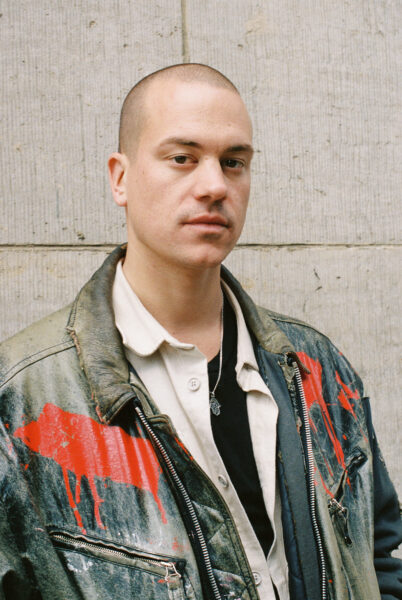
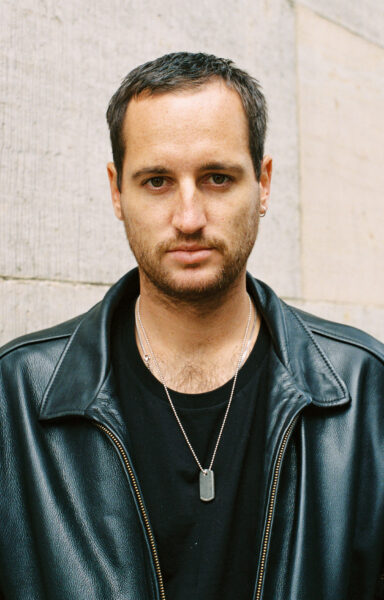
Writing a lot on a typewriter is for him the way to stay inspired. But everything that falls into his perception can be turned into a creative stimulus. “I read a lot of poetry. I also steal a lot of poetry, and I try to steal it, and it does not work because it always becomes something else,” he smiles and reveals that he sings of Ohio because of a poem by the American poet Lucy Brock-Broido. “This track was very dystopian, and it fit perfectly. ‘Thinking of you in a different city’ was such a nice line to sing. And I thought, you know what, I am going add some words to it, but she really nailed it there. There are no rules. If people feel that, then you have your job done.”
The songwriter believes that you can sing anything if you feel it. “I have this thing when I write, and sometimes it hurts a little bit, and I am like, oh, that is the right path. Go there. And the same thing when we are in the studio. If it makes you happy or if it makes you perceptive or if it really just hurts a little bit because you are confessing something, you are on the right path for a good song.” It is a process that has its highs and lows “but once you have it, it feels effortless. It feels like drinking a cup of tea almost. Sometimes it is so hard that you feel like you are cutting a tree that does not want to be cut,” however, that is unlikely to become a good song in his experience. “The best songs were ones often where I had no effort; there was no tension.” They in fact discarded an early version of Choirs to Heaven before they decided to give it another chance. The chorus was missing, and a friend who was with them prompted all to the piano. “We sat there like three little boys playing a song, and it was effortless. Everything came together like a nice puzzle piece,” the two of them beam as they recall the moment of creative satisfaction and the scenery of the Spanish coast.
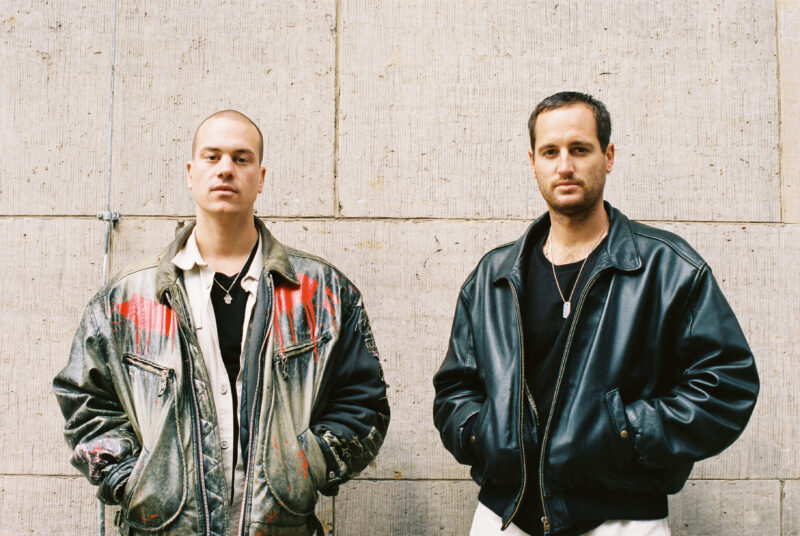
We all have to adjust
Beyond the new album, the pair has several other pieces coming together. “I took over the management,” Julien explains, “and we set up our shop and centralised everything in the hope that we would hopefully see some income, which we didn’t see before.” One of the ideas was to make a book to accompany the release. “It’s just a nice item to have when you listen to the album, and you have every lyric and behind the scenes photos, the story of behind each song, maybe a little secret that nobody knows. I like the format of coffee table books because you can put it on the living room table, and when friends come over, they can take it and look through,” Julien muses as he browses through a copy next to him.
A few days ago, they were able to resume their Porzellan Bar nights held on the riverbank in front of Funkhaus, where they invite other musicians to play. “I think it’s a nice way to be social with people,” Julien illuminates their motivation and reveals both of them wish to have a bar one day. “Some of the fans in Berlin can come around and meet us in person. It’s always nice to meet the people who buy your records and come to the shows, but at the shows, it’s sometimes really stressful. They want to talk to you, and the next one wants to buy something, and the venue wants to close. So, it’s nice to meet some of them and have the chance to talk with no time pressure.”
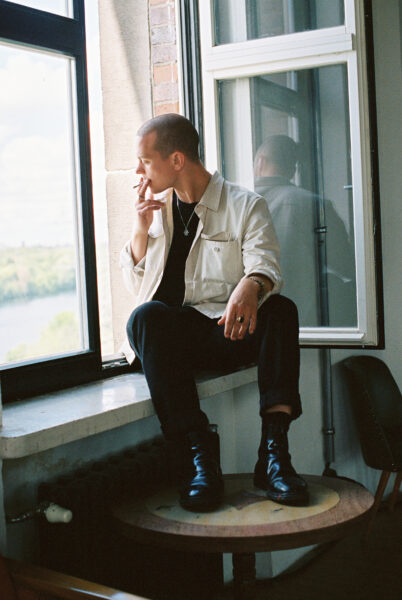
While the possibilities of meeting people remain limited, the duo has adopted other ways of interacting with their fans. They speak enthusiastically about their Patreon which they started in January in the hope to cover their costs. “The aim was to make a 1000 Euro per month from that, and we are already kind of there. We have a cool community there with people from around the world,” Markus tells me. Another goal was to find a different form of communication than the fast-paced social media channels. “Instagram needs to look good. We have some dignity. TikTok – we’re not on there – but it’s very fast and super real. No one takes the time to concentrate. But we are people who take three years to make an album,” the singer elaborates. “We listen to every song and see if it grows, what can we add. Patreon is where people take time to really concentrate on what you’re doing. You can give them songs you’ve just made, put them on there and see what happens. Whatever you release, people on Patreon have heard it before in some way, and they kind of have a say in it. I like the live stream so much because you get all these comments,” he says of the experience which has been entirely new to him. “Because usually, let’s be honest, it’s showing off. I am at this venue and this studio and that, but real life is so much more interesting, like a stage. You can’t pretend; everyone sees you. That’s a cool thing. Social media is super interesting. There are so many ways to do it.”
As anyone else, Lea Porcelain have a tough year behind them, but Markus and Julien seem to have managed to make what they could out of it and grow as a band. “I think we have to adjust, and also the band learned how to adjust to this. Because the people who don’t learn how to adjust now, I think they will have a hard time surviving. If it’s a venue or an artist, and the concept that venues have always change, security concepts change. And the ones who don’t adjust, they have a hard time, I think,” Markus contemplates. “We also had a hard time, but then we thought, let’s make it different and adjust, and it was good for us in the end. Nothing but hope and passion, indeed.”
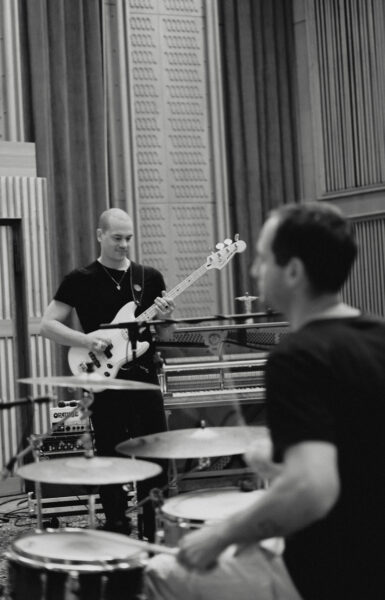
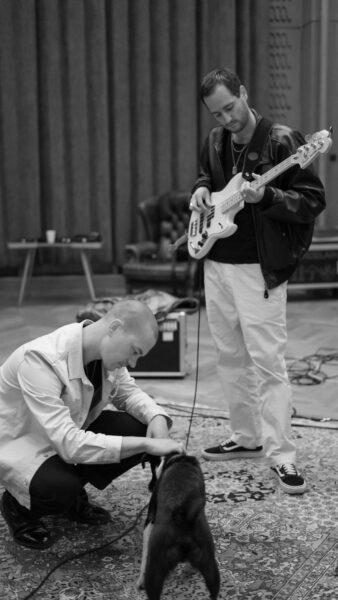
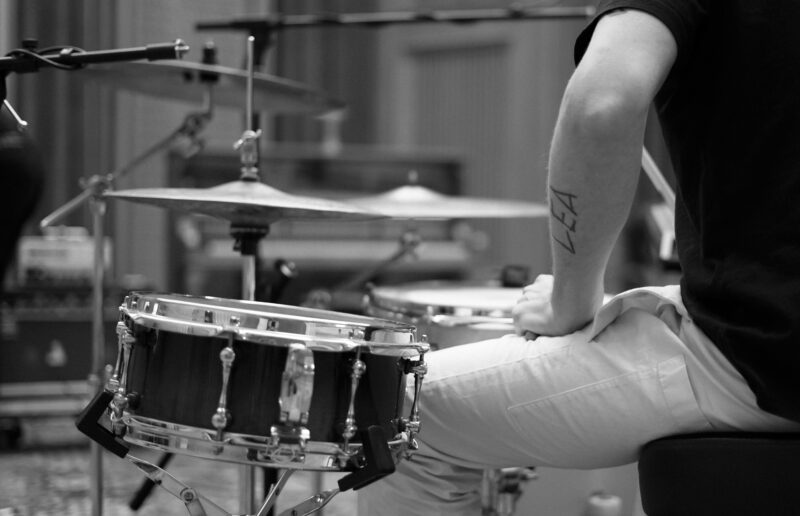
All Photos by Liv Toerkell for NBHAP
Choirs To Heaven is out now via the band’s own Lea Porcelain Recordings label and they are heading on tour next spring.



